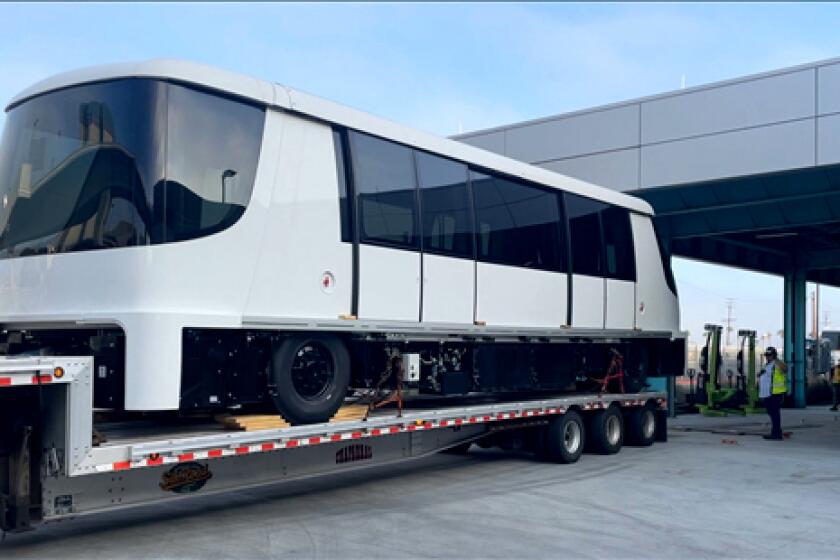Metro tries out new tech to find hidden weapons on subways

- Share via
Los Angeles will utilize AI-powered scanners at Union Station over the next month in an effort to stop passengers with hidden weapons from boarding the rails.
Commuters descending to underground platforms for the A, B and D lines (formerly known as the Blue, Red and Purple lines) will enter the testing ground for Metro’s 30-day pilot program, which went into effect on Tuesday, though the scanners will not run every day. The program arrives amid growing concern over passenger safety, with Metro recording an uptick in arrests this year for riders carrying concealed weapons.
The roughly 6-foot-tall Evolv Technology scanners use artificial intelligence to pinpoint on a person’s body where they could possibly be carrying a weapon, according to the company’s website. All weapons are banned on the Metro system, and it is illegal to carry a concealed firearm without a permit in California.
Metro officials declined to reveal the name of the vendor at a news conference on Wednesday, but the Evolv logo was emblazoned on the scanner along with the Metro branding.
“For the integrity of the process we’re not naming any of the vendors,” a Metro spokesperson said in an emailed statement.
After Mayor Karen Bass called for a surge of law enforcement on the Metro system in May, she and other officials acknowledge that more must be done to improve safety.
Over the summer, the Metro board approved the rollout of three new security technologies that will be tested at Union Station at separate times through the end of the year. The findings of the pilot programs will then be presented to the board to determine which system works best.
The first pilot program is akin to a security checkpoint at a sporting event, but individuals will be randomly selected to pass through the scanners by Metro security officers. For example, every 5th, 10th or 20th commuter could be asked to pass through the scanner to check for hidden weapons.
“When we’re talking about this particular pilot, the idea is layering in a process and a protocol that makes sense for our system, but also ensuring that we’re doing it in a way that’s discreet, noninvasive,” Metro’s top security official, Robert Gummer, said during the press conference at Union Station.
“Since last year, we’ve seen a doubling of arrests when it comes to weapons on our system. Obviously, it’s a critical issue for us. It’s something that we take seriously and we feel that exploring these technologies is the first logical step in improving safety on our system.”
Metro officials say the new system can be adjusted for higher volumes of riders. The hope, they said, is that the process won’t affect people who bring their personal property onto the Metro system. If the scanner detects a concealed firearm, Metro security officers will check whether the person has a permit before calling police to investigate, officials said.
The L.A. Galaxy soccer team used the same system earlier this year at Dignity Health Sports Park in Carson.
Four train cars arrived at Los Angeles International Airport, completing the upcoming Automated People Mover’s total set of 44 and shifting the focus of the long-awaited project to testing.
On Wednesday, a rush of morning commuters watched as Metro officials made a mock run through the system.
One official carried a weapon-shaped object in their pocket and was flagged by the system. Appearing on a monitor with a red box around their pocket, the official was then directed to a security checkpoint with a Metro security officer.
Several commuters snapped photos with their phones and grinned at the scene.
“Good, good, more safety,” said a rider who declined to give their name as they made their way to a train on a lower platform.
At Wednesday morning’s press conference, Metro did not scan any customers in front of the media, so there was no way to see the system in real-world action.
The new checkpoint will be put to the test in the coming weeks, when the rail lines encounter a World Series crowd making its way to and from Dodger Stadium.
There were an estimated 33.2 million Metro rail boardings or trips in the first half of 2024, slightly up from 32.3 million in the same time last year.
More to Read
Sign up for Essential California
The most important California stories and recommendations in your inbox every morning.
You may occasionally receive promotional content from the Los Angeles Times.













